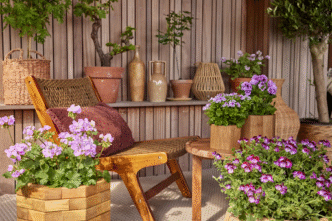Working from a garden room can actually boost your professionalism if you set it up right. Having a dedicated, distraction-free space outside your home helps you focus, stay organized, and meet deadlines more effectively. It’s about creating an environment that supports your work habits.
You might wonder if working in a garden is too informal to seem professional. But with good internet, proper lighting, and minimal noise, your garden room can match or even improve the vibe of a traditional office. It lets you separate work from home life, which can sharpen your mindset.
If you’re thinking this sounds too good to be true, the rest of this post will walk you through why a garden office can help your work life—and how to make it genuinely professional without losing that relaxed garden feel.
How Garden Rooms Shape Professionalism
Using a garden room as your workspace can influence how you approach your job. It creates a clear setting that helps you get into work mode, handle distractions better, and enjoy mental perks that boost your focus and attitude.
Defining Professionalism in a Home Setting
Professionalism means more than looking sharp on camera. In a garden room, it’s about creating a space that supports your work habits and productivity. This includes having a tidy desk, reliable tech setup, and good lighting that match a formal office vibe.
You’re signaling to yourself and others that work is taken seriously when your garden room mirrors a professional environment. It’s easier to stay disciplined when the space is designed for productivity rather than casual home use.
Establishing Work-Life Boundaries
A garden room physically separates your work from home life, making it easier to switch off after hours. This boundary helps reduce interruptions and clears mental clutter. When your workspace is in the garden, you’re less likely to blur the lines between work time and downtime.
You can create routine cues by leaving the garden room at the end of the day, which reinforces when work starts and ends. This separation improves your professionalism by encouraging consistency and respect for your schedule.
Psychological Benefits of a Dedicated Space
Having a garden room provides a mental boost that comes from changing your environment. It reduces stress linked to working in distracting areas like the kitchen or bedroom. You’ll likely feel more motivated and focused, with fewer stray thoughts pulling you away.
A dedicated space like this supports habits that make professionalism easier to maintain, including organized work habits and better concentration. It also fosters a mindset where you’re fully “at work,” even if you’re technically home.
Key Features That Enhance Productivity
Your workspace needs to support focus, comfort, and connectivity. Paying attention to light, temperature control, and technology can make working from your garden room much easier and more efficient.
Natural Light and Connection to Outdoors
Natural light boosts alertness and reduces eye strain while working. When your garden room has large windows or glass doors, you get plenty of daylight and a view of the outdoors, which helps clear your mind.
Adding plants can improve air quality and create a calm atmosphere, making you feel less trapped inside. This connection to nature lowers stress and can improve your mood during busy workdays.
Position your desk near the windows to maximize light exposure without glare on your screen. Proper window treatments, like blinds, help control brightness throughout the day.
Role of Insulation and Comfort
Good insulation keeps your garden room at a steady temperature, so you don’t get too hot in summer or too cold in winter. This consistent comfort means fewer distractions and longer focus periods.
Look for high-quality wall, roof, and floor insulation materials. Double-glazed windows help keep noise out and warmth in, creating a cozy work environment.
Adding features like heating, fans, or air conditioning lets you adjust the temperature when needed. Comfortable seating and proper ventilation also support your productivity.
Reliable Wi-Fi and Technology
Wi-Fi speed and stability are critical for video calls, large downloads, and cloud-based work. You can boost your signal to the garden room with a Wi-Fi extender or a mesh system.
Make sure your workspace has enough sockets or USB ports for charging devices. Consider wired Ethernet if Wi-Fi is inconsistent to avoid interruptions during important tasks.
Organize cables and keep tech equipment tidy to reduce distractions and maintain flow. Reliable tech setup means fewer glitches, letting you focus on your work.
Designing Your Garden Room for Professional Success
To set yourself up for real focus and growth, your garden room should feel both functional and comfortable. Creating a space that fits your work style and adds little conveniences will help you keep professional habits sharp.
Personalizing Your Workspace
Your garden office should reflect how you work best. Start with a desk and chair that suit your posture and task needs. Add a reading nook nearby if you often dive into books or documents during breaks.
Use colors and art that inspire but don’t overwhelm. Plants can freshen the air and boost mood without cluttering your desk. Think about lighting too—natural light is best, but adjustable lamps help when it’s cloudy or late.
Consider a meditation space in a corner if you want to manage stress easily during the day. This can be as simple as a cushion and a small rug where you can pause and reset.
Adding Productivity-Boosting Amenities
Small extras make a big difference when you’re working alone. A mini fridge stocked with water and healthy snacks will keep you energized without interrupting your flow.
If you have breaks between tasks, weights or simple exercise gear in your garden office can encourage quick workouts or stretches. This can improve circulation and keep your energy steady.
Make sure technology is streamlined—good Wi-Fi, a reliable power setup, and cable management go a long way. All these details help your garden workspace stay professional and practical.
Practical Considerations and Long-Term Value
Investing in a garden room involves choices about space, legal requirements, and future use. Your decision can affect how well the space works for you now and in the long run.
Garden Room vs Home Extension
Garden rooms offer a quicker, often cheaper alternative to home extensions. They usually don’t require major construction, so you avoid lengthy building projects inside your house.
A log cabin style garden room is popular because it’s easy to install and blends with outdoor spaces. On the other hand, home extensions add permanent living space but involve more disruption and cost.
If you want a dedicated workspace separate from the main house, a garden room might keep distractions down. Extensions can integrate your office but reduce separation between work and home life. Think also about insulation and wiring needs for comfort and functionality.
Planning Permission and Regulations
You generally don’t need planning permission for garden rooms under permitted development rules. But size limits apply—usually no taller than 2.5 meters if within 2 meters of a property boundary.
If your property is in an Area of Outstanding Natural Beauty, stricter rules often exist. You’ll need approval to protect the environment. Check with your local council before building.
If your garden room will serve multiple functions—say a games room or a meditation room—you might want to confirm its classification. This can affect whether planning permission is required.
Value and Versatility Beyond Work
Garden rooms can increase your property’s resale value, particularly if they add flexible living space. Buyers often like homes with extra, separate rooms.
You aren’t limited to an office. Use your garden room as a hobby space, games room, or meditation room. This versatility means you get more out of your investment.
Consider durability and materials so the room remains useful for years. Weatherproof finishes and good insulation can make the space comfortable year-round, maximizing your value.
Conclusion
Working from a garden room can definitely change the way you approach your workday. It offers a dedicated space away from household distractions, which can help you stay focused and feel more professional.
You might notice that having a separate, quiet workspace helps you switch gears mentally. This can make meetings and tasks feel more organized and intentional.
That said, professionalism also depends on your habits and mindset. A garden room won’t automatically make you more professional, but it can support habits that do.
Here’s a quick look at what a garden room offers for your professional vibe:
| Benefits | Notes |
| Fewer distractions | Helps maintain focus |
| Clear work/life split | Can boost mental clarity |
| Personalized space | Allows you to work comfortably |
If you create a routine and respect your workspace, this setup could improve how you present yourself in professional settings—even virtually. It’s really about how you use the space.














